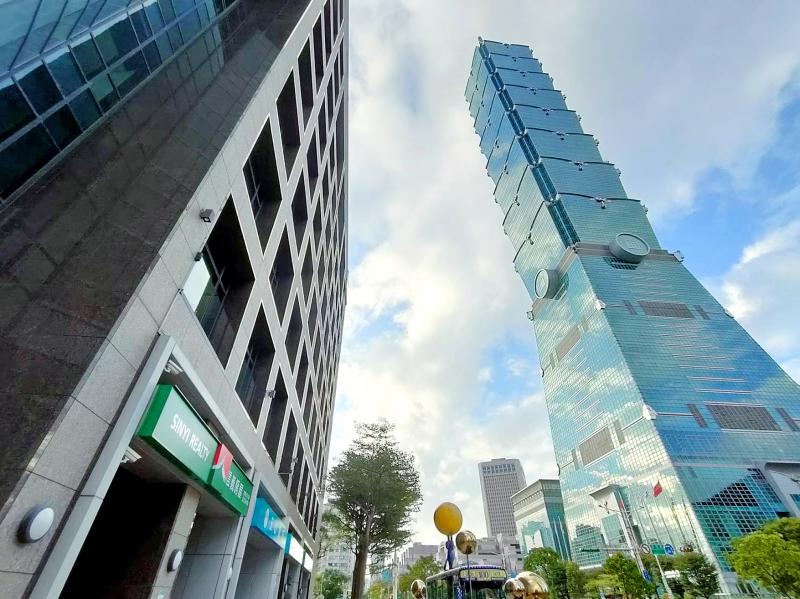Rent for grade A office space in Taipei gained 4.4 percent this quarter to NT$2,953 (US$99.63) per ping (3.3m2), with vacancy rates hovering around historic lows of 2 percent amid continued demand from tech and non-tech firms, the local branch of Jones Lang LaSalle Inc (JLL) said yesterday.
The vacancy rate made Taiwan the best performer in Asia, despite the COVID-19 pandemic, JLL Taiwan Ltd (仲量聯行) said.
The commercial property market — especially office buildings, which generate stable rental income — was resilient even as COVID-19 cases increased, JLL Taiwan managing director Tony Chao (趙正義) said.

Photo: Hsu Yi-ping, Taipei Times
INSURERS
Office spaces are particularly attractive to local life insurance companies which need to park funds and defend against inflation, Chao added.
Taiwan’s low vacancy rate also has to do with high-tech firms and traditional manufacturers expanding their capacity to accommodate increasing business, Chao said.
Some landlords have taken advantage of the pandemic this quarter to upgrade their office spaces to make them more environmental friendly and competitive, he said.
Vacancy rates were the lowest in Taipei’s Nangang District (南港) at 0.8 percent in the April-to-June period, supported by demand for large headquarters and the city government’s promotion of the suburban area, JLL Taiwan said.
Vacancy rates in Neihu District (內湖) fell below 4 percent due in part to limited supply, it said.
JLL Taiwan stood by its expectations that vacancy rates would remain between 2 and 4 percent for the next three years on the back of solid demand from local firms.
URBAN RENEWAL
Urban renewal efforts would help fuel relocation needs and accelerate digestion of new spaces, the broker said.
There might be 100,000 ping of new office space added in the next five years, giving tenants more options, it said.

SEEKING CLARITY: Washington should not adopt measures that create uncertainties for ‘existing semiconductor investments,’ TSMC said referring to its US$165 billion in the US Taiwan Semiconductor Manufacturing Co (TSMC, 台積電) told the US that any future tariffs on Taiwanese semiconductors could reduce demand for chips and derail its pledge to increase its investment in Arizona. “New import restrictions could jeopardize current US leadership in the competitive technology industry and create uncertainties for many committed semiconductor capital projects in the US, including TSMC Arizona’s significant investment plan in Phoenix,” the chipmaker wrote in a letter to the US Department of Commerce. TSMC issued the warning in response to a solicitation for comments by the department on a possible tariff on semiconductor imports by US President Donald Trump’s

The government has launched a three-pronged strategy to attract local and international talent, aiming to position Taiwan as a new global hub following Nvidia Corp’s announcement that it has chosen Taipei as the site of its Taiwan headquarters. Nvidia cofounder and CEO Jensen Huang (黃仁勳) on Monday last week announced during his keynote speech at the Computex trade show in Taipei that the Nvidia Constellation, the company’s planned Taiwan headquarters, would be located in the Beitou-Shilin Technology Park (北投士林科技園區) in Taipei. Huang’s decision to establish a base in Taiwan is “primarily due to Taiwan’s talent pool and its strength in the semiconductor

An earnings report from semiconductor giant and artificial intelligence (AI) bellwether Nvidia Corp takes center stage for Wall Street this week, as stocks hit a speed bump of worries over US federal deficits driving up Treasury yields. US equities pulled back last week after a torrid rally, as investors turned their attention to tax and spending legislation poised to swell the US government’s US$36 trillion in debt. Long-dated US Treasury yields rose amid the fiscal worries, with the 30-year yield topping 5 percent and hitting its highest level since late 2023. Stocks were dealt another blow on Friday when US President Donald

UNCERTAINTY: Investors remain worried that trade negotiations with Washington could go poorly, given Trump’s inconsistency on tariffs in his second term, experts said The consumer confidence index this month fell for a ninth consecutive month to its lowest level in 13 months, as global trade uncertainties and tariff risks cloud Taiwan’s economic outlook, a survey released yesterday by National Central University found. The biggest decline came from the timing for stock investments, which plunged 11.82 points to 26.82, underscoring bleak investor confidence, it said. “Although the TAIEX reclaimed the 21,000-point mark after the US and China agreed to bury the hatchet for 90 days, investors remain worried that the situation would turn sour later,” said Dachrahn Wu (吳大任), director of the university’s Research Center for